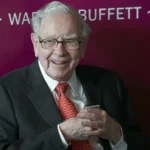Warren Buffett, the renowned investor and head of the multinational conglomerate holding company Berkshire Hathaway (BRK.B), shared his perspective on international trade and tariffs during the company’s highly anticipated annual shareholder meeting on Saturday, May 3, 2025. Speaking at the CHI Health Center in Omaha, Nebraska, Buffett did not hold back, labeling trade wars as a “big mistake” and emphasizing his belief that trade should not be utilized as a tool of conflict.

Understanding Berkshire Hathaway’s Stake
To fully appreciate the weight of Buffett’s comments, it’s important to understand the nature of Berkshire Hathaway. The company is not a single entity but a vast holding company that owns a diverse range of businesses spanning numerous sectors, including insurance, railways (BNSF), energy (Berkshire Hathaway Energy), manufacturing, retail, and services (like Geico, Dairy Queen, Fruit of the Loom, etc.).
This widespread exposure to various parts of the U.S. and global economy gives Berkshire, and consequently Buffett, a unique perspective on the practical impacts of trade policy and economic conditions. Therefore, comments on issues like tariffs come from a leader whose company feels these effects directly across multiple industries.
Buffett’s Strong Stance on Trade
Addressing thousands of shareholders and a global audience watching the live broadcast, Buffett articulated his philosophy on international commerce. He stated unequivocally, “Trade should not be a weapon,” adding the striking point that “trade could be an act of war.” These statements highlight his view that using trade barriers or tariffs aggressively can escalate tensions between nations beyond economic competition.
Buffett also reflected on America’s historical trajectory, noting, “The United States won. I mean, we have become an incredibly important country, starting from nothing 250 years ago, there’s nothing that anything like it.” This context suggests his belief that the remarkable growth and importance of the U.S. were achieved within a framework of relatively open trade, implying that moving away from this could undermine future prosperity.
Financial Performance and Tariff Concerns
Earlier on Saturday, before Buffett took the stage, Berkshire Hathaway released its first-quarter earnings report. The report showed that Berkshire’s operating earnings for the first three months of the year fell by 14% compared to the same period in 2024. The insurance underwriting business, a significant part of the conglomerate, saw its earnings decline sharply, bringing in $1.33 billion in Q1 2025, a nearly 50% drop from the nearly $2.6 billion generated in the first quarter of the previous year.
Significantly, Berkshire’s quarterly note accompanying the earnings report explicitly addressed potential risks from trade policy. The company stated that “Changes in macroeconomic conditions and geopolitical events, including changes in international trade policies and tariffs, may negatively affect our operating results and the values of our investments in equity securities and of our operating businesses.”
The company added caution, acknowledging, “We are currently unable to reliably predict the nature, timing or magnitude of the potential economic consequences of any such changes or the impacts on our Consolidated Financial Statements.” This language from the corporate report directly underscores the potential negative impact that trade policies, including tariffs, could have on Berkshire’s diverse operations and investments, aligning with Buffett’s public critique.
Market Uncertainty Over Trade Policy
Buffett’s long-awaited comments on tariffs come at a time of growing uncertainty in global markets and the economy. Major stock indexes have experienced significant volatility in recent weeks, influenced by concerns surrounding President Donald Trump’s announced “sweeping tariffs” and the potential effects these trade barriers could have on international commerce, supply chains, and overall global economic growth. Investors have been eager to hear the perspective of a figure as respected as Buffett amidst this climate of unpredictability regarding future trade relations.
Trade as a Tool or a Weapon
Buffett’s distinction between trade as a beneficial activity and trade used as a weapon resonates with economic theory that emphasizes the mutually beneficial aspects of international trade when conducted under open and fair conditions.
Using tariffs or trade restrictions as punitive measures or bargaining chips can disrupt these benefits, potentially leading to retaliatory actions from other countries, harming export-oriented industries, increasing costs for domestic businesses and consumers, and creating global economic friction rather than fostering cooperation and growth. His view positions tariffs not merely as economic tools but as potentially harmful instruments that can undermine global stability.
Economic Arguments Against Tariffs
Buffett’s stance aligns with arguments made by many mainstream economists who caution against the widespread use of tariffs. Critics of tariffs argue that they typically lead to higher prices for consumers as the cost of imported goods increases. They can also harm domestic businesses that rely on imported components or materials.
Furthermore, tariffs often provoke retaliatory tariffs from affected countries, hurting companies that export goods and services. These cascading effects can disrupt complex global supply chains that have been built over decades, impacting efficiency and profitability for businesses with international operations – a direct concern for a company like Berkshire Hathaway.
The ‘Woodstock for Capitalists’ Platform
The Berkshire Hathaway annual shareholder meeting, affectionately dubbed “Woodstock for Capitalists,” is a major event that draws tens of thousands of attendees from around the world. The meeting, parts of which are broadcast live (like on CNBC), provides a massive platform for Warren Buffett and his vice chairman (previously Charlie Munger, now Greg Abel) to share their thoughts on the economy, investing, and current events.
The high profile of the event ensures that Buffett’s remarks, particularly on timely and contentious issues like trade policy, receive widespread attention from investors, policymakers, and the media globally. This year’s meeting also saw notable attendees, including former Democratic presidential nominee Hillary Clinton and Apple CEO Tim Cook, underscoring its importance.
At 94 years old, Warren Buffett remains a central figure at the meeting. While much of the discussion focused on the company’s performance and investment strategy, there was also expected commentary regarding his succession plans, a topic of ongoing interest given his age and long tenure with the company since its formation in 1965. However, his strong rebuke of trade wars and tariffs stood out as a key takeaway from the weekend’s commentary.








